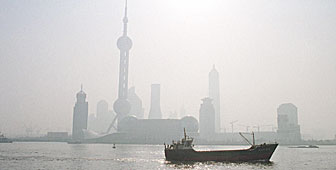Swiss cement closer business ties with China

A delegation of Swiss business leaders visiting China has agreed to boost economic ties between the two countries.
An accord, signed in Zurich on Monday by Business Network Switzerland (OSEC) and the Chinese Chamber of Commerce, is aimed at forging closer working relationships between small and medium sized enterprises (SMEs) in the two countries.
David Syz, second in command at the Swiss economic ministry, led the week-long trip to China, which took business and scientific leaders to Beijing and Shanghai.
Speaking to swissinfo from China, David Syz said: “We have had very positive results on all levels of our mission.”
However, some observers pointed out that the trip was not without a hitch.
Missing the point
Charles Kleiber, the Swiss state secretary for science and mission participant, admitted that the delegation’s ambitions may have been too large and not coordinated enough.
“Within the Swiss delegation, the synergies between business and science did not work effectively. We did not communicate enough, and perhaps the programme was too diverse and overloaded,” he said.
Kleiber said more might have been achieved with a single, broad, interdisciplinary theme, rather than a something-for-everyone approach.
According to witnesses, only a few of the Chinese guests showed up for seminars dealing transport issues, where some participants looked “passive and rather bored”.
One critic said that some of the seminar presenters might have misunderstood China and its culture. “Maybe they had not done their homework. The fact remains that, as the adventure drew to an end, some of the ninety Swiss participants could not conceal a degree of disappointment”, he said.
One of the problems, may be a misunderstanding of where China stands as an economy, according to Kleiber. No longer a “virgin market”, China is not interested in “development cooperation”. “They are more advanced than that,” said Kleiber.
“But there are opportunities for new partnerships, for example joint laboratories, in Shanghai and elsewhere,” he said.
Flood of delegations
In 2001 alone, some 70 international business delegations visited China, leading participants to speculate about whether he endless procession was saturating China’s interest.
According to Gérald Béroud, a Sinologist, the Chinese also emphasise personal contact, rather than market studies and seminars.
“The Western world and China are completely different. And this is also true in business matters, ” Béroud said.
“With a Chinese partner, trust has to build up slowly and patiently. Dinners together, conversations about one’s family and other aspects of private life – things which are commonly neglected in Western business practice – are fundamental here.”
“These things need to be carefully nurtured, at the political level and between companies.”
Falling trade barriers
The delegation found that high regulatory barriers to trade in China had eased dramatically since the country’s accession to the World Trade Organisation (WTO) last year.
“All investors here clearly believe that [regulatory hurdles] have improved very much in the past few months. This is why I am no longer hesitating to encourage SMEs to come here – the preconditions are much better than they were two years ago,” Syz said.
“In the past decade we have multiplied by four or five our imports and exports, and I imagine it will be a similar story in the next ten years.”
Swiss exports to China currently amount to SFr5.7 billion ($3.65 billion), according to the Swiss Chinese Chamber of Commerce.
The delegation of 90 people focused on the pharmaceuticals, transportation and environmental technology industries – areas viewed as offering the best investment opportunities for Swiss business.
Syz said he had been graciously received by his Chinese hosts. “It was very positive, this was the real success of the mission,” he said.
He added that the visit set the stage for closer relations with his Chinese counterparts and believed the two countries had developed friendly ties during the visit.
Scientific exchanges
The delegation also travelled to Chinese universities to tempt Chinese doctoral students away from the United States – where many have gone to study – to Switzerland. The mission described their efforts to attract doctoral students as “positive”.
“We want to create a brain drain in favour of Switzerland,” Kleiber said. “We are going to select and identify post-doctoral students who are willing to work on common projects.”
But Kleiber said the movement of students would not be just one way, as Swiss doctoral students would also be spending time at Chinese universities.
The eight-day trip to China marks the first visit by a Swiss delegation since China joined the WTO at the end of last year.
Switzerland was one of the first countries to invest in the country, after the country opened its economy following the Mao era.
On Tuesday, the countries signed three accords to promote environmentally friendly technologies.
by Karin Kamp, Anna Nelson and Marzio Pescia in Beijing-Shanghai

In compliance with the JTI standards
More: SWI swissinfo.ch certified by the Journalism Trust Initiative








You can find an overview of ongoing debates with our journalists here . Please join us!
If you want to start a conversation about a topic raised in this article or want to report factual errors, email us at english@swissinfo.ch.